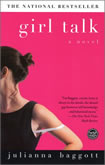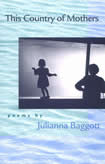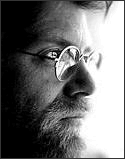|

|
Julianna
Baggott's latest novel, The
Miss America Family,
 © Pocket Books
© Pocket Books
has
just made The Boston Globe's bestsellers list.
Baggott received her MFA
from the University of North Carolina at Greensboro in 1991.
The recipient of fellowships from the Delaware Division
of Arts, Virginia Center for the Creative Arts, Ragdale
Foundation, and Bread Loaf Writers' Conference, she has
placed poems and short stories in dozens of literary journals
including Poetry, The Southern Review, Chelsea, Cream City Review, Quarterly West, Ms.
Magazine as well as the acclaimed anthology Best
American Poetry 2000.
Girl Talk, her first
novel,
 © Pocket Books
© Pocket Books
also published by Simon
and Schuster's Pocket Books, was a national bestseller and
is now out in paperback.
Baggott is also the author of
the poetry collection This Country of Mothers,
 © Southern Illinois Press
© Southern Illinois Press
published by Southern
Illinois University Press.
Her third novel, The
Madam, will be published by Simon and Schuster's Atria
Books in August 2003.
She lives in Delaware with
her husband, poet David G.W. Scott and their three young
children.
The Mysterious Life of Eppitt Clapp:
An All-True False Biography
An Excerpt
Julianna Baggott
Chapter One:
Boy Eats Heart of King
In the end, Eppitt Clapp wore his insanity
like a conspicuous top hat, a bee beard, a demo fire suit in flames.
He had stopped trying to buttonhole it, because when he did, he only
found himself stuffing the buttonhole with a boutonniere and then in
minutes a garden of his own craziness was blooming, heavy with perfume,
weeping on his chest.
And when he was trying to stay "in-tact,"
as he called it, he was so nervous, he would bleed, a family trait.
Before he was shot to death in his bed
at the age of 31 in 1972, Eppitt charged into Baltimore Public with
ice cream for the librarians, one Susan Mollet in particular. Imagine
the push-ups softening in their canisters, the Rocketeers turning to
mush in the chilled cardboard box, but Eppitt was victorious, flushed,
gleaming with sweat, a mad man at the circulation desk. He died for
love, a fact that would have made him supremely happy.
Inventor of the Big Girl, a bold renovation
in the vacuum cleaning industry, Eppitt Clapp was, in fact, a millionaire.
He was also a lover of the Dime Museum, a poet, and a clipster extraordinaire
filling forty-seven volumes with newspaper articles. He suffered from
mania, thermaphelia (a love of heat), compulsions. He claimed to have
two hearts. He was quite crazy, yet, in his own way, brilliant. And,
as he said in an interview with The Boston Globe, Isn't craziness how
we are doomed and blessed?
Eppitt Clapp was raised by his mother, Milda, a soft spoken, yet matter-of-fact
beauty, who worked in Sheppard Pratt, a mental institution, and his
grandmother, Alice Clapp, a caldron of a woman. Round and steely, she
was disliked by most everyone who knew her. She ran a small ring of
coin-operated laundromats and was notorious for not refunding any money
even when her machines broke down and resorted to chewing garments.
But she was soft with Eppitt, her soul moist and tender for that boy
like the inner muscle of an oyster.
They lived in a one-bedroom efficiency
in Baltimore, 114 York Road. Eppitt slept between his rotund grandmother
and his slender mother in a double bed until he was twelve. He had no
father. And when Eppitt would ask about him—because at some point
in his life he realized that he had to have had a father, somewhere,
once upon a time—his grandmother would say, "You are a bastard,
Eppitt Clapp. And there's nothing wrong with that."
This would happen while his grandmother
was stuffing quarters into stiff rolls, an interminable task in the
coin-op business, and his mother was cooking dinner, perhaps scraping
beans that had burned, sticking to the bottom of a pot, while the smoke
alarm trilled violently overhead. (Mrs. Clapp was one of the first to
have a smoke detector.) Milda was a terrible cook, but her mother refused
to spend time in the kitchen. She didn't like the gas burner's open
blue-ringed flame. Her husband had died in a fire at the Avis Dorman
High School where he was a teacher, and she often smelled smoke, had
the habit of patting herself down, stemming from a fear that she was,
suddenly, inexplicably burning. And so the cooking fell to Milda.
"In fact," Eppitt's mother
would go on, "when the psychologists in the ward ask the grown
men about their fathers, the men will usually say that they were never
sure if they were loved by their fathers. They cry like babies. You
don't have to
worry about such things. Your father never knew you existed. How could
he have scarred you by not loving you?"
His grandmother, her fat-puffed finger
lost packing down the roll, would say, "In this way, you'll see
that you have an advantage."
"Yes," his mother would finish,
cutting the burner off, "you've been done a great service."
Milda Clapp believed in service. She
wasn't a psychiatrist. She wasn't a nurse either, although they let
her wear a kind of formal pink uniform. She filed and cleaned, but considered
herself knowledgeable in the workings of the human mind. She was fired
from Shepard Pratt in 1962 after being caught having a sexual relationship
with a patient, Arnold Pinter. Her only comment was that she felt it
was beneficial for his therapy. It was rumored that this was not an
isolated incident, however, and that Milda had a long, sordid history
of prescribing and providing this kind of sexual therapy.
It was a lie that Eppitt's father didn't
know he existed, a sweet lie, woven around the back and forth answer
that the two women had practiced to cloying perfection. (Lying about
paternity wasn't new to Alice Clapp.) Sworn to a pact, they wrapped
Eppitt in the lie and bundled him around his childhood.
Eppitt had the charm of a doted-on child. He was
cocky, scrawny. His dark eyes had a wily shine. He was already particular
about his food it could never mix and he only ate pale colors, nothing
green or orange or red, nothing loud. He would say as an adult, "Food
shouldn't scream at you!" And his clothing couldn't bind or chafe.
His mother cut the feet off of his pajamas, the tags from his shirts,
and let him wear his neck ties on Sundays so loose that he looked like
a pencil-necked drunk.
Despite the family propaganda that he
had a leg up by being fatherless, he still wanted a father, and he had
a vague notion that his father was tall, bookish and so extremely prestigious,
that the man had gotten caught up in some kind of high-ranking position
that took all of his time. So distracted by the giant matters of the
grown-up world, his father had had sex with Eppitt's mother, but forgot
to check back with her on the outcome of that intercourse.
Eppitt knew about sex at a young age.
When he was six, his mother and grandmother took him on a bus to a novelty
museum one stuffy summer afternoon. It was outside of Baltimore, out
Joppa Road, a large house on a farm, not really a museum at all. There
were wild peacocks barking in the yard, along with mangy dogs. Eppitt
would recall one legless dog, bending his ear toward his jiggling stump,
but unable to scratch, and a statue of St. Francis, stained with brittle,
blue bird droppings. There was a small sign "Welcome. Museum of
Antiquities. Free to the Public." Alice Clapp, Eppitt's grandmother,
knew the owner, an old man, lispy and gimp from a stroke. He was few
years older than she was, but she didn't mention knowing him, and he
didn't seem to recognize her.
"This museum is not appropriate
for that age," he said in a marble hallway, pointing at Eppitt
with a long finger on his good hand. "He won't understand."
"He understands everything,"
the stern, rotund Alice Clapp countered. "Don't you, Eppitt?"
"I do," Eppitt said.
The old man took them around his house,
pointing out paintings and pulling ancient curios from behind glass-front
hutches. He hobbled up the stairs and took them to the room of his conception
and birth.
He said, "This is where my parents
had relations and I began to take root in my mother, growing inside
of her until I was a mere six pounds two. And here on this bed, I was
pushed out of her and into the world."
Eppitt poked out from behind his grandmother's
rump and giant handbag. "What does that mean, had relations?"
There were no other guests in the room
or in the house. The old man glared at Milda, as if to say I told you
so, and rolled his eyes in disgust.
Then Eppitt's grandmother turned to the
boy. "Oh, it's nothing Eppitt. A man gets with a woman. He becomes
herky jerky like that mechanical pony in front of Woolitzers, grunts
a bit and then a baby begins to grow." Alice Clapp had been disenchanted
in the matters of love, although she recalled one Mr. Gillheny, a science
teacher, a romantic, the floor of his cramped office, and one time with
her husband, Martin, when it had all been quite different, shortly before
he died in the fire.
"You make it sound so tempting,"
the old man said, sarcastically.
And Eppitt's grandmother said, "Eat
your heart out."
Eppitt whispered to his mother. "Is
that how it's done? Is that how there's a mother and a father?"
"Yes, hush," Milda said, grabbing
his hand and hurrying him to the next room.
It was just a coincidence that the old
man then brought the family into the guest room which contained his
prize possession: the supposed heart of a British King. Here the story
is muddled. Milda recalls it was King Louis the XIV's heart and Alice
angrily disputes that it was an earlier Louis's heart. The old man pulled
out a silver box, green from a lack of polish, and opened it. He told
them that tombs had been ransacked but the heart had been kept separate.
"One of my heirs absconded with
the heart before it was lost in the tumult."
The heart, a leathery prune of an object,
lay in the velvety box. The old man held the box out with his good hand,
the other was wizened and pinned tightly to his side, his curled fingers
covering his own frail chest, protectively.
Eppitt was confused, of course. He wanted
a father. He'd heard his grandmother tell the man to "eat his heart
out" and he'd asked his mother if that was, in fact, how a mother
and father came to be. She said yes. And here was a heart.
Before anyone could stop him, Eppitt
reached inside of the box, popped the wizened heart into his mouth and
choked it down. It was, at least, no longer bright red as he'd seen
in pictures of hearts, and so it was okay to eat, by Eppitt's strict
definitions.
Eppitt's mother gasped, "Eppitt,
spit it up. Eppitt!" She hit her son on the back and rattled him
by the arm. "Eppitt! Eppitt!"
When questioned years later by a pretty
young reporter for the Baltimore Sun why he'd never married, Eppitt
would answer that the heart is a leathery thing, tougher than you'd
thing and very hard to chew.
The old man was ashen. "Who, who
would do such a thing?"
Eppitt's grandmother picked Eppitt up
and held him to her chest like a baby, although he was six years old.
"How dare you offer such a thing to a child? You are a sick man!
A sick man, indeed! To offer a heart to a young boy like it's a candy!"
Alice Clapp was accustomed to turning things around on people. How many
times had she accused someone standing in front of her with a shredded
garment of breaking her machines?
And so Alice marched out of the house
with Milda scurrying beside her, Eppitt clamped so tightly to her chest
that he could only see out of one wide terrified eye. They walked down
the long driveway to await the bus, which after a mute hour or two,
appeared in a whirling cloud.
So the first article that Eppitt ever
snipped and pasted into a white-paged book—a gift from his grandmother—was
about himself. There was a photograph of Eppitt standing on the steps
of his apartment building, his mother's and grandmother's skirts the
only background as he smiled broadly. He recalls the flare of the flash.
His grandmother, always thinking fire, let out a small gasp.
The reporter was shaggy, his necktie,
worn like Eppitt's, more a loose leash. In fact, his face was jowly
and his eyes round and wet like a dog's. He asked, "Did you really
do it?"
"Yes, sir."
"But why?"
"It's hard to explain." Eppitt
stared up at him, wide-eyed. "Are you staying for dinner?"
"No."
"Oh," he said, "I thought
you wanted to stay."
"I've got to write this up."
"Oh."
It was a failure, this second heart.
It didn't create a father. The caption read: Boy Eats Heart of King.
And so Eppitt Clapp had two hearts, one hopeful, one a memory of failure,
and he claimed he could always hear both of them beating.
© Julianna Baggott
|
 |
